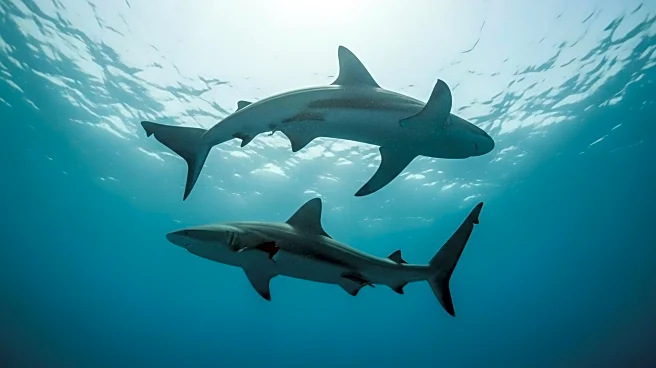What is the story about?
What's Happening?
Marine biologist Hugo Lassauce from the University of the Sunshine Coast in Australia has recorded a groundbreaking video of three Indo-Pacific leopard sharks engaging in a mating ritual off the coast of New Caledonia. This marks the first documented case of leopard sharks mating in the wild. The video captures two male sharks mating with a female in quick succession, lasting 110 seconds. Lassauce had been snorkeling with the sharks weekly for a year as part of an aquarium monitoring program, leading to this rare observation. The footage has been documented in a paper published by the Journal of Ethology.
Why It's Important?
The recording of the mating ritual of Indo-Pacific leopard sharks is significant for marine biology and conservation efforts. These sharks, also known as zebra sharks, are nearly extinct due to overfishing. The video provides valuable insights into their mating behaviors, which can aid in conservation strategies. The ReShark program aims to repopulate their native habitats by breeding them in captivity and releasing them into the ocean. This initiative is crucial for preserving biodiversity in the Coral Triangle, a region home to 76% of the world's coral species and vital for fishing, tourism, and coastal protection.
What's Next?
The ReShark program continues to focus on repopulating the Indo-Pacific leopard shark's native habitat. Accredited aquariums breed these sharks in captivity, and their eggs are transported to nurseries in Raja Ampat, Indonesia. Once hatched, the sharks are reared, tagged, and released into the ocean. This program is part of broader efforts to recover endangered shark and ray species globally. Continued research and monitoring are essential to ensure the success of these conservation efforts and to expand them to other species.
Beyond the Headlines
The successful documentation of the mating ritual highlights the importance of long-term scientific observation and collaboration in conservation efforts. Ethical considerations in wildlife conservation, such as the impact of human interaction and captivity on natural behaviors, are crucial in shaping future strategies. The ReShark program exemplifies a proactive approach to species recovery, emphasizing the role of scientific research in addressing environmental challenges.

















